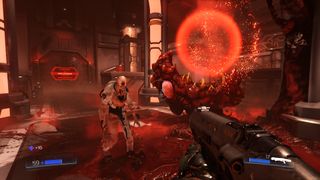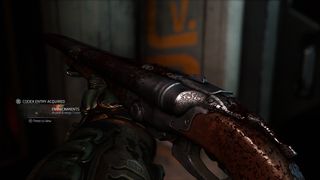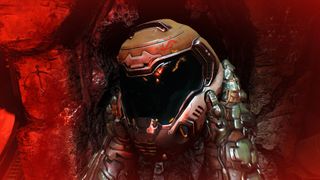

Greg Kasavin is a writer and designer at Supergiant Games, the independent studio behind Bastion, Transistor, and the upcoming Pyre. Prior to joining Supergiant, Greg worked at 2K Games, Electronic Arts, and GameSpot. Seeing his excitement for it, we asked Greg if he'd like to write a guest post about the new Doom and he kindly agreed—this is his take on id Software's bold homage to the original.
How do you improve on a classic? The answer is you don't. If we're talking about a genuine classic, something that not only was created to the very highest standard of its time but has held up well ever since, then that by definition isn't something you can make much better. Even if you fine-tune some of the rough edges or update the presentation or whatever, you're not going to re-capture what it was like to experience that thing in the first place. Yet, folks just keep on trying, and not just with games. It's not hard to understand why. Popular properties and franchises are like seeds that can bear fruit every so often. And Doom for sure was ripe.
Doom shows remarkable restraint and humility in its design.
The idea of there being a new Doom game at some point was more or less a cosmic certainty. Like many other cosmic certainties, though, it wasn't something I was looking forward to or thinking a lot about. I thought my days of being excited for games from id Software were well behind me. It's nothing against id. It's just that when things I care about a lot are sequeled, reimagined, rebooted, or anything like that, I've come to approach those works with healthy skepticism or plain old indifference. Doom just seemed predictable.
So, like many others from what I can tell, I was taken aback in the best possible way by this latest game. Apart from all the blistering action, it's filled with reverence for the 1993 original. It's not a reboot—it's an homage. For all its flash and violence, rendered with the sort of care and attention to detail one would expect from Doom, it shows remarkable restraint and humility in its design. It's so familiar yet feels fresh, the perfect nostalgia piece come at the perfect time. As a former game critic, as a current game developer, and as a lifelong game player and fan of the original classic, I salute this game and the team that had the wherewithal to make it with such thought, skill, and care. When asked to say more about all that here at PC Gamer, you can imagine my response.

At some point that must have happened years ago, I stopped having a great time playing first-person shooters. My rationale was that this style of game was no longer for me. I felt I'd seen all the story beats, the weapons, the bad guys... and the play itself had become rote to me. A genre that was once synonymous with pure action evolved into something more methodical, and less to my taste. For example, a central mechanic of many shooters is that you sit there doing nothing while your wounds magically seal up. I've done this so many thousands of times by now that the tension is lost on me, and my attention soon goes someplace else. The new Doom's promise is to remind people like me of why we fell in love with this style of game to begin with.
It's interesting to look at how shooters evolved in response to Doom. At first, most shooters were like Doom. Then, shooters started asking questions. They weren't always deep questions, but still, what if you had to stop and reload your weapons from time to time? Then you couldn't keep firing nonstop and would have to choose your moments to engage. What if you had to take advantage of cover? Then there'd be more to combat than just running and dodging. What if you had very limited health? Combat could feel more dangerous as well it ought. What if there was a story? And so on. Some very good shooters were born of these questions. And now, it's taken more than 20 years for those re-examined assumptions to become the cookie-cutter standard of today, so now it's Doom presenting the alternative to the trend.

Today it's Doom asking the hard-hitting questions about reloading, about cover, about health, and story, and so on. With boldness and restraint, it even asks such questions of the original Doom's design: What if you could jump and climb as quickly as you could run? What if your enemies could navigate the environments about as effortlessly as you yourself? What if you had ways of replenishing your health and ammo on the spot? What if you got Quake II's railgun? Again, these aren't deep questions. But they have everything to do with the experience of playing the new Doom, and when you're in the heat of the moment in the game, you're not there to think deep thoughts. Your mind is racing, to be sure, but it's fully occupied with how you're going to negotiate whichever ridiculous onslaught you happen to be in at the time.
You're on a mission in this game, but it's not the mission your mission briefer guy is going on about.
Other aspects of Doom really took me by surprise. I did not expect for the music to be so integral to the game, and was struck by just how strongly it set both the tone and the tempo. I also really did not expect to care so much about the game's silent, anonymous player character. Through a series of very colorful first-person animations, he comes to life and takes on a clear and specific personality. I felt for him as a character, despite him being a stasis-frozen hell-infused space marine, an experience I can't personally relate to. Doom isn't known for its storytelling, but the opening moments of this game were some of the most efficient storytelling in games that I've played in a long time, and there were plenty more great moments still to come. Look, many games have you playing as an angry dude. The new Doom somehow transcends the cliché and takes this idea to new heights. The player character's actions, apart from being surprising and fun to watch, are rich with subtext. You're on a mission in this game, but it's not the mission your mission briefer guy is going on about.
The biggest gaming news, reviews and hardware deals
Keep up to date with the most important stories and the best deals, as picked by the PC Gamer team.

Like any classic, the original Doom could be interpreted in many different ways. In its day, it drew no small amount of controversy for its special cocktail of graphic violence, occult subject matter, and straight-up popularity. The new Doom, just by virtue of being derivative of a game from more than 20 years ago, maybe isn't capable of having the same cultural impact. But so what?
Back then, as I saw controversy swirl around one of my favorite games, I felt grateful that I didn't see it that way. Doom was a positive force in my life. I was just another kid for whom games were more than just a hobby. They enriched my understanding of the world and of my own self; they were more than just fun. Doom, for example, was a game about quite literally conquering one's fears—you’re killing demons! And, in the end, there’s nothing they can do to stop you. You can try as many times as it takes until those scary Barons of Hell and whatever else are nothing to you anymore. I wish I always felt as determined in life as I felt playing that game. Of all the things I wouldn't have guessed the new Doom could re-capture, I never would have expected it to get that part so right. You wouldn't think a game called Doom could be so uplifting.
The collective PC Gamer editorial team worked together to write this article. PC Gamer is the global authority on PC games—starting in 1993 with the magazine, and then in 2010 with this website you're currently reading. We have writers across the US, UK and Australia, who you can read about here.
Most Popular




